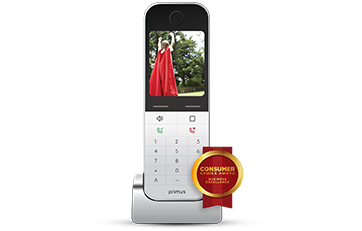Brought to you by Primus - a smart choice for your Internet and Home Phone services.

Scammers love Black Friday and Cyber Monday because it’s the busiest shopping time of the year. People are on the lookout for deals, and they may be more motivated to save a dollar than to consider whether they’re being scammed. Here’s how to protect yourself.
Phishing Newsletters
A “phishing” attack is when a scammer sends you a fake email to solicit your information. For example, you’ll see a newsletter that looks like it’s from a big box retailer offering a great deal on a TV, and if you click it you’ll end up on a site that looks just like the big box retailer’s, but when you enter your credit card information, they’ll just harvest it.
But, there’s an easy remedy to this: first, check out the details to see if the email address they’re using is legit. The other thing you can do is just avoid clicking the link in the email and navigate to the site independently. If you don’t see the deal mentioned in the email, it might be a phishing attempt.
Don’t Open Email Attachments
Retailers won’t put deals in an email attachment, so don’t open any attachments from retailers should you receive one.
Of course, keep this in mind with other emails too. You might get an email from what looks like a shipping company, your credit card company, or even the government purporting to be investigating some kind of fraud.
Beware Big Door Busters
Black Friday is a great way to get a $1,000 TV for $50—if you’re one of the first 10 people in store! Be sure to check for that fine print. If you’ve ever wondered why people camp out for Black Friday, that’s why.
Use a Secure Connection
Be sure that the internet you’re using is secure. Don’t use public Wi-Fi—you need to take a bunch of security precautions when you use it, and sending your credit card information over public Wi-Fi is never smart. You should also take steps to ensure your own home internet is secure.
Be Aware of Black Friday Versions of Products
One way retailers offer deep deals on things such as TVs is by making special Black Friday versions of said TV. For example, if a normal version of a BigBrand 700 has four HDMI ports, two USB ports, and comes with wireless headphones, the Black Friday version might only have one HDMI port, no USB ports, and no headphones. This isn’t a scam, per se—it actually might be a deal if you don’t need a bunch of features and are willing to save a few hundred bucks to forgo them—but you should be aware of this practice when Black Friday shopping.
Avoid Too-Good-to-Be-True Deals
Deals offering free gift cards are often too good to be true. Same with offers of free products for completing surveys. It pays to be a little skeptical of online offers.
Inspect Gift Cards
When you buy a gift card in-store, inspect it to be sure it hasn’t been tampered with. There should be a film or something covering the numerical code on the back. Be sure it hasn’t been scratched off.
Monitor Your Accounts
After a bunch of Black Friday / Cyber Monday shopping, check your credit card statements regularly. If you got scammed, it’s better to find out sooner rather than later so you can start dealing with it right away.






